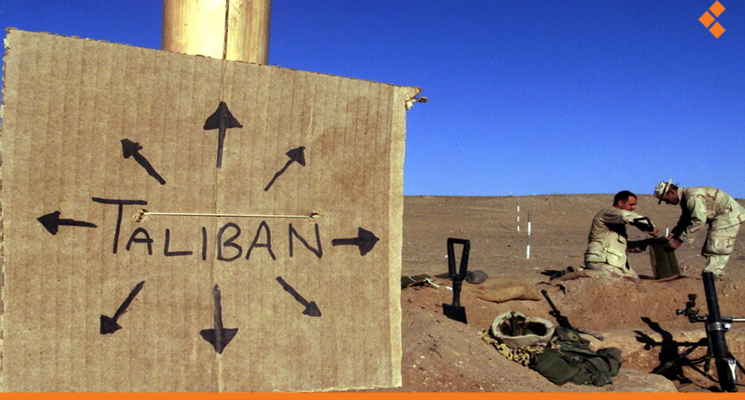As the U.S. completed its retreat from Afghanistan, nearly 20 years after American troops were sent there by President George Bush as a reaction to the 9-11 terrorist attacks, Kabul was falling to the jihadists of the Taliban, sealing their control over the country, sparking the interest of the political spheres in Syria.
In fact, according to the Syrian-French researcher Salam Kawakibi, the Syrian elites were sharply divided in their attitudes towards the developments in Afghanistan. “Islamists, both moderate and extremists, celebrated it as a commendable victory of political Islam,” he told The Syrian Observer. As for secular left-wing nationalists, they praised the fall of Kabul as a victory of anti-imperialism against the U.S. and its proxies, as if Guevara himself was leading the Taliban. Finally, a third current was worried by the victory of the “Islamic Emirate, as it marks the return of an oppressive and backward ideology,” Kawakibi explains.
The U.S. in Syria
And in truth, shortly after the fall of Kabul, Taqi al-Din Omar, an official from the Information Relations Office of Hay’at Tahrir Al-Sham (HTS), which controls significant areas in Northeastern Syria, was congratulating the Taliban on their takeover.“Any liberation movement worldwide makes us believe that the world is still full of free people, who intend to live in freedom and dignity,” Omar told the al-Quds al-Arabi newspaper.
In the meantime, the Syrian Arab News Agency (SANA), the regime’s official news agency, was calling the U.S. intervention in Afghanistan “another failed war,” which adds to the “defeats,” of Washington in the Middle East. It even quoted Zamir Kabulov, Russian President’s special envoy to Afghanistan, as saying “Taliban’s seizure of power in Afghanistan was not the result of certain agreements, but rather the result of Washington’s failure in this country.”
Furthermore, Deputy Foreign Minister of Syria Bashar al-Jaafari told the pro-regime al-Watan newspaper, in reaction to the success of the Taliban, that “what the Americans did in Afghanistan, they have also done in other countries; so what happened in Afghanistan is a lesson for everyone, in the region and the world.”
The fact that stakeholders in Syria are so invested in what is happening in Afghanistan comes as no surprise to Ibrahim Hamidi, senior Diplomatic Editors at Asharq al-Awsat, who specializes in Syrian Affairs. “The events in Afghanistan are of particular interest to all the actors in Syria,” he told The Syrian Observer.
“For starters, the Syrian Democratic Forces are worried that their fate might be similar to that of the Afghan Government. In other words, they fear that the Americans would retreat from the area, leaving them at the mercy of a military intervention by their rivals, such as the Syrian regime. The latter would then be able to impose its military presence in the Syrian Jazeera,” he added.
Read Also: The Future of Syria as Seen by Regional and International Stakeholders
Nevertheless, the perspective of a U.S. retreat from Syria does not seem very probable at the moment. In fact, at the end of July, and although the Biden Administration was announcing the U.S retreat from Afghanistan, and to a lesser degree, Iraq, a senior official from the administration was telling Politico that troops would remain in Syria for the foreseeable future. “I don’t anticipate any changes right now to the mission or the footprint in Syria,” the official said, on condition of anonymity. According to him, the U.S. has been successful in its fight against ISIS along with the SDF, and it intends “to continue this way.”
Similarly, in his remarks on the situation in Afghanistan, President Biden mentioned the resurgence of ISIS and al-Nusra in Syria as threats that deserve the attention of the administration, unlike the “threats of yesterday.”
“And that’s why, as President, I am adamant that we focus on the threats we face today in 2021 — not yesterday’s threats. Today, the terrorist threat has metastasized well beyond Afghanistan: al Shabaab in Somalia, al Qaeda in the Arabian Peninsula, al-Nusra in Syria, ISIS attempting to create a caliphate in Syria and Iraq, and establishing affiliates in multiple countries in Africa and Asia,” Biden explained.
But in addition to the fight against terrorism, the North Press Agency, which is close to the SDF, also mentioned the Russian presence in Syria as a factor that makes a retreat of U.S. troops unlikely in the near future. As a matter of fact, North Press quotes Nicholas Harris, a researcher at the Center for a New American Security (CNAS), as warning against such a scenario, as leaving the SDF under a Russian guarantee would most likely yield results similar to what is happening in Daraa, and would allow the Russians to extend their influence in the region.
Victory of Jihadism
“As for the HTS, they see the victory of the Taliban in Afghanistan and the establishment of an Islamic Emirate there as a victory for Islamic Jihadism, which they hope they could import to Syria,” Hamidi said.
In fact, according to the pro-government Syrian daily Athr Press, the Tunisian Islamic thinker and journalist Salaheddine al-Jourchi claimed during an interview with DW Arabia: “What happened in Afghanistan will restore the confidence of terrorist organizations and violent fundamentalist groups such as al-Qaeda, its affiliates, and ISIS. It will reassure them that what they call jihad can lead to self-affirmation and achieving political objectives. This development will affect the security situation in the Arab region.”
Thus, according to Jourchi, international and regional powers in the Middle East should adapt their foreign policies per this development.


